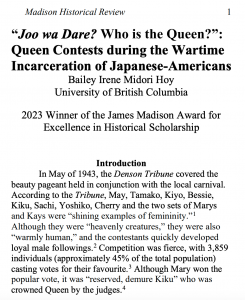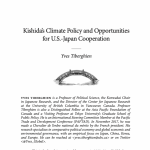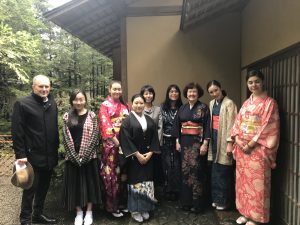Last Updated: May 2023
Association for Asian American Studies Conference

The Center for Japanese Research would like to congratulate CJR Research Fellow Nicole Yakashiro for presenting her research at the Association for Asian American Studies Conference in California in March. Nicole presented her paper, “Complicating Covenants: Property Formation, Race, and Neighbourly Relations in Settler Colonial British Columbia, 1910s-1930s”, which focuses on how in the 1930s, British Pacific Properties developed an exclusive neighborhood called the “British Properties” in West Vancouver. Racial covenants were attached to these properties, prohibiting African or Asian individuals from living there. Advocates have challenged this injustice since the 1960s, focusing on property rights. However, Nicole’s paper complicates this understanding by highlighting the larger settler-colonial context of neighborly relations and property formation on Indigenous lands. This opens up new ways to articulate the relationship between property and race, contextualizing racial covenants and dispelling their exceptionality in British Columbia’s settler-colonial history.
Read more about the conference here.
Canadian Historical Association Conference

The Center for Japanese Research would like to congratulate CJR Research Fellow Nicole Yakashiro for being selected to present her research at the Canadian Historical Association in Toronto on May 29-31. Founded in 1922, the Canadian Historical Association | La Société historique du Canada is a bilingual not-for-profit and charitable association devoted to fostering the scholarly study and communication of history in Canada. The Association seeks to encourage the integration of historical knowledge and perspectives in both the scholarly and public spheres, to ensure the accessibility of historical resources, and to defend the rights and freedoms of emerging and professional historians in the pursuit of historical inquiry as well as those of history degree holders who utilize the analytical, research, communication, and writing skills they acquired during their studies to pursue a variety of career paths inside or outside of academia.
Read more about the conference here.
Oxford Transnational and Global History Seminar and Conference

The Center for Japanese Research would like to congratulate CJR Research Fellow Bailey Irene Midori Hoy for being invited to the Transnational and Global History Seminar and Conference in Oxford on June 5-6. The conference will explore diaspora, identity and belonging as a framework to navigate transnational geographies, epistemic taxonomies and racial cartographies — creating opportunities to map memory, belonging and power in new ways. Bailey will be presenting her research virtually on June 5 and the CJR would like to recognize her efforts in contributing to Japanese research at an international level.
Read more about the conference here.
“‘Joo wa dare?’ Who is the Queen?” Queen Contests During the Wartime Incarceration of Japanese Americans

Bailey Irene Midori Hoy, an Institute of Asian Research fellow at the Center for Japanese Research, recently had her senior thesis published in the Madison Historical Review’s 2023 Spring Volume. The paper examines beauty pageants held at incarceration centers during the Japanese-American internment. Bailey’s paper was also awarded the James Madison Award for Excellence in Historical Scholarship and the Center for Japanese Research would like to congratulate Bailey on her achievements and contribution to the CJR.
Please read the article HERE.
Feel free to contact Bailey about her research at bailey.hoy@mail.utoronto.ca.
Kishida’s Climate Policy and Opportunities for U.S.-Japan Cooperation

Professor Yves Tiberghien recently published an academic essay in Volume 18, Issue 1 of the Asia Policy, administered by The National Bureau of Asian Research. “Kishida’s Climate Policy and Opportunities for U.S.-Japan Cooperation” summarizes key trends and drivers in Japan’s climate policy, with an emphasis on the acceleration of commitments and policies that has taken place during the Suga and Kishida cabinets, and reviews the policy implications.
Please read the article here.
The Japanese Media Responds to Pressure from the Right: Attacks by politicians on freedom to report on war-memory trigger increased output in quantity and quality
Andrew Horvat, an Institute of Asian Research Senior Fellow at the Center for Japanese Research, presented a paper at the International Political Science Association Convention in July 2021. Andrew’s research focuses on how the Japanese news media has been able to function as the historical conscience of the country, generating a steady stream of news stories and documentaries focusing on Japan’s role as an aggressor in World War II, harsh ruler of occupied territories, and ultimately a thoroughly defeated and humiliated nation. He also explores how Japan’s liberal news media were able to withstand public attacks by leading politicians (including the prime minister) aimed at undermining media influence during a period of resurgent right- wing nationalism under conservative Prime Minister Abe Shinzo (2006-2007, 2012-2020).
Feel free to contact Andrew about his research at andhorvat@gmail.com.
Please read the article HERE.
“Threads of a Past Life”: Kimono in the Lives of Japanese Canadian Women
Bailey Irene Midori Hoy, an Institute of Asian Research fellow at the Center for Japanese Research, recently published a peer reviewed article in the Journal of the Asia-Pacific World which explores the kimono as a source of cultural knowledge and identity amongst Nikkei women in Canada.
Feel free to contact Bailey about her research at bailey.hoy@mail.utoronto.ca.
Abstract:
This research explores kitsuke (kimono and the art of wearing kimono) as a source of cultural knowledge, identity, and power amongst Japanese-Canadian/Nikkei women today. Focusing on women with ties in the Greater Toronto Area, we attempt to defetishize the idea that kimono and the people who wear them are “traditional” and “never-changing.” In examining the collective narratives that shape the history of many Nikkei women, we found that the highly visual and symbolic nature of the garment made the kimono a sort of “universal heirloom,” in which memories and culture are stored amongst our participants as an item that could be used to “perform” their cultural identities.
We conducted semi-structured interviews over the phone and Zoom video conferencing software with Japanese-Canadian women above the age of 18. Books, newspapers, digital museum archives and their curators, etc. helped consolidate the history of kimono and contextualize the interviews.
Please read the article HERE.
Daffodils and Dispossession: Nikkei Settlers, White Possession, and Settler Colonial Property in Bradner, BC, 1914–51
Nicole Yakashiro, an Institute of Asian Research fellow at the Center for Japanese Research, published a peer reviewed article in the BC Studies: The British Columbian Quarterly, which explores forced sales of property, namely daffodil bulbs and farms, owned by Nikkei farmers before 1943 in the rural community of Bradner, British Columbia.
Nicole’s article was also awarded the BC Studies Prize in 2021, an annual prize to the author of the best paper published in the journal each calendar year. The prize, funded by donations, is intended to encourage and celebrate high-quality work on British Columbia, regardless of topic or discipline.
Abstract:
This article focuses on the forced sales of property, namely daffodil bulbs and farms, owned by Nikkei farmers before 1943 in the rural community of Bradner, British Columbia, known as the “daffodil capital” of Canada. By centring the microhistorical workings of property dispossession in one local context, it connects fields commonly treated as distinct – settler colonialism and Japanese Canadian history – to reveal how settler colonial property logics and practices were employed by the state and ordinary settlers to secure white possession. Drawing primarily on state records, I trace how the federal government dispossessed four Nikkei daffodil-farming families in the 1940s by using contradictory, uneven, and contested rationales and strategies. More specifically, I identify three property characteristics – definition, value, and boundaries – that the state manipulated to reconfigure Nikkei property for white ownership. In doing so, I denaturalize common narratives of property as stable and argue that the dispossession was not an anomalous moment of state racism, as has been largely understood, but a project that renewed a regime founded on the elision of Indigenous sovereignty and the construction of white settler property. By highlighting the state’s lies, both big and small, this article demonstrates the fundamental fictions of the settler property regime in British Columbia. These were fictions that Nikkei settlers were both invested in and were betrayed by in the 1940s.
Please read the article HERE.
Can Elections Survive the Digital Age?

Professor Yves Tiberghien, Professor Heidi Tworek and Masters Student Panthea Pourmalek has published an article titled, “Can Elections Survive the Digital Age?” in the Center for International Governance Innovation. This piece was recently recognized as the most read this week in the Center for International Governance Innovation and aims to understand the role of social media in elections and highlights the need for digital governance to move beyond analyses focused on Europe and North America.
Please read the article HERE.
Japanese PM Kishida visits Ottawa, asks for Canada’s help on clean energy transition

Professor Yves Tiberghien’s insights on Canada-Japan trade relations were featured in the Richmond News in an article regarding Kishida’s recent visit to Ottawa. Professor Tiberghien noted that Canada gained “first-mover advantage” by inking the trade deal with Japan, which the United States still hasn’t done.
Please read the article HERE.
Past CJR co-director Christina Laffin represented the Centre at a signing ceremony for a Memorandum of Understanding with the Institute of International Studies at Gakushūin Women’s College in November 2019.
Christina Yi receiving the promotion to the rank of Associate Professor in the Department of Asian Studies in May 2020. Congratulations!
The proceedings from the Hokkaidō 150 Workshop has been published as a roundtable in Critical Asian Studies in October 2019.
The new publication is accessible through the UBC library to students and faculty here(alternative). Interested readers who do not have UBC library access or other institutional access to Critical Asian Studies should reach out to Professor Tristan Grunow for access to the article.
More information on the Hokkaidō 150 Workshop can be found on the Meiji 150 website here.
Language, Education, Pedagogies, Museum Studies
David Anderson published “The role of the museums as sites for learning how to teach and change educational practices.” in Museum Informatics, Vol. 5; Museum and Communication, Chap. 2 in 2018 and “Long-term memories on visitors of world expositions: A brief review on the studies of memories of the world expositions in Montreal, Osaka, Vancouver, Brisbane, and Aichi” along with S. Shimizu in Expology. His upcoming publication includes “My identity in the garden – Self reflections of expatriates’ garden visits” with S. Yamashita in the Journal of Museum Education.
Ryuko Kubota published Eigo kyōiku gensō [Misconceptions of English language teaching and learning] in 2018. She also published widely on English language teaching in Japanese in 2019, which includes:
- Kubota, R. (2019). Komyunikēshon ryoku o sodateru eigo kyōiku: Kuritikaru na shiten kara [English language teaching that fosters communicative ability: From critical perspectives]. In Y. Ayabe (Ed.), Shōgakkō eigo kyôiku e no sermon tiki apurōchi: Kotoba no sekai o hiraku [Professional approaches to teaching English in elementary schools: Opening doors to the world of language] (pp. 283-298). Yokohama: Shumpusha.
- Kubota, R. (2019). Nihon ni okeru gaikoku ni rūtsu o motsu kodomo no tame no keishōgo kyōiku to gengo seisaku [Heritage language education and language policies in Japan for children with overseas roots]. In K. Kondo-Brown, M. Sakamoto, & T. Nishikawa (Eds.), Oya to ko o tsunagu keishōgo kyōiku: Nihon/gaikoku ni rūtsu o motsu kodomo [Heritage language education connecting generations: From the Japanese perspective] (pp. 268-282). Tokyo: Kurshio Shuppan.
- Kubota, R. (2019). English in Japan. In P. Heinrich & Y. Ohara (Eds.), The Routledge handbook of Japanese sociolinguistics (pp. 110-126). Abingdon, UK: Routledge.
- Kubota, R. (2019). Gengo kyōiku seisaku ni okeru komyunikēshon o kangaeru [Rethinking “communication” in language-in-education policies]. In S. Sato (Ed.), Komyunikēshon to wa nani ka: Posuto komyunikatibu apurōchi [What is “communication”: Post-communicative approaches] (pp. 76-98). Tokyo: Kuroshio Shuppan.
Literature, History, Anthropology
Millie Creighton published A Treehouse in Tokyo: Reflections on Nikkei, Citizenship, Belonging, Architecture, and Art on the 75th Anniversary of Japanese American and Japanese Canadian Internment in 2017. The article deals with the 75th anniversary of the internment of Japanese Americans and Japanese Canadians, so is timely now with 2020 as the 75th anniversary of the end of WWII, and the article also relates this to current policies and perspectives on immigrants and refugees in Japan, Canada, and US.
Dr. Creighton and her graduate student Basant Ahmed Sayed participated in the 6th annual Egycon Cosplay Competition held in Cairo, Egypt in 2019.
She also now teaches a course The Japanese Tea Ceremony, which is created and initiated as the first of its kind university credit course in Canada which includes both typical university style classroom lectures/discussions, with the actual practice of embedded learning of Chado or the Japanese ‘Way of Tea’ within the Japanese tea house in Nitobe Memorial Garden on the UBC campus.You can read more here: https://anth.ubc.ca/2016/06/01/students-learn-about-the-japanese-tea-ceremony/

Dr. Creighton (on left) in her prize-winning character Momohime (the Peach or Pink Princess) and graduate student Basant Ahmed Sayed (on right)

Photo of one of the final tea session groups also attended by some guests such as UBC Ambassador Wendy Yip (wife of Pres. Ono).
Nam-Lin Hur is currently conducting research on Japan’s invasion of Korea in 1592-1598. He recently contributed “Buddhist Culture in Early Modern Japan.” and “Toyotomi Hideyoshi’s Invasion of the Chosŏn Kingdom, 1592-1598” in Oxford Research Encyclopedia of Asian History.
Christina Yi published her monograph Colonizing Language: Cultural Production and Language Politics in Modern Japan and Korea in 2018, and contributed to an edited journal issue Zainichi Special Feature in Azalea: Journal of Korean Literature & Culture in 2019. She also published a literary translation of “Trash” by Kim Talsu, in Zainichi Literature: Japanese Writings by Ethnic Koreans in 2018.
Colleen Laird published an article titled “One Ghost, Two Shells: The Transnational Treasure Text of Kikuchi Rinko” in Feminist Media Studies in February 2020.
Economics and Political Science
Masao Nakamura published “Japan’s ultimately unaccursed natural resources-financed industrialization,” with (R. Morck) in Journal of The Japanese and International Economies in 2018 and “An economic assessment of present and future electronic-waste streams: Japan’s experience” (with H. Hayami) in E-waste Recycling and Management: Environmental Chemistry for a Sustainable World in 2020. He was also contributed in The Globe Post‘s opinion in January 2019 with an article titled “Why Japan’s new immigration law could cause public backlash.”
Marc-David Seidel is currently the director of the W. Maurice Young Centre for Entrepreneurship and Venture Capital Research, which held the Inaugural EGOS and Organization Studies Kyoto Workshop in December 2019. The workshop was co-sponsored by EGOS, Copenhagen Business School Entrepreneurship Platform, Kyoto University Faculty of Economics, and the W. Maurice Young Centre for Entrepreneurship & Venture Capital Research at the University of British Columbia. He also served on the Scientific Committee of the workshop, as well as a mentor in the Doctoral Consortia paper development workshop held
prior to the primary workshop in Kyoto.